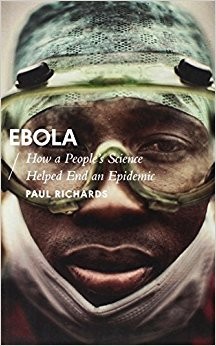As other reviewers of this book have mentioned, there is probably few who are better suited to write this book than Paul Richards, with such a depth of knowledge and experience of the areas where the epidemic occurred. In "Ebola: How a People's Science Helped End an Epidemic" (2016) the author argues that faced "with the realities of the disease the common folk learnt to think like epidemiologists. As interestingly, epidemiologists began to think like the common folk. Merged understanding was crucial to epidemic control" (p. 4). Throughout, the author makes a case that 'citizen science' enabled individuals and communities to respond effectively, in difficult and resource-constrained situation, to help end the Ebola epidemic.
At least in my reading, the case for a people's science helping to end the Ebola epidemic was not convincingly made. Unless, one considers all forms of responses (i.e. requesting protective materials, finding alternatives when materials were in short supply, practicing quarantine) as 'citizen science'. There may be more to Richard's story of citizen science (alluded in the Kailahun District example of declining infections before any major international response, but the book focuses upon the actions of a medically-trained individual leader, less on citizen science). I suppose the definition of citizen science is my main divergence with the author's argument – as my own experience and understanding of 'citizen science' is somewhat different. Examples (from the 'global South') of participatory budgetary monitoring to ensure accountability and community-based counter mapping to advocate for land rights come to mind. Enforcing quarantine is a form of thinking like an epidemiologist, but this also assumes a low level of pre-existing knowledge – one might alternatively view this as an expected response to an epidemic based on historical experience with different diseases.
What I thought this book did well, on the other hand, was make a case for the importance of detailed, ethnographic research. He writes:
"Social mobilization was needed to create an environment in which biosafety control measure would be accepted and enhanced. Was there expertise to address these kind of social challenges? The social sciences are less strongly supported relative to other areas of scientific knowledge formation globally, but especially in Africa, where sometimes politicians equate social investigation with political opposition. Much necessary social knowledge is locked up in the heads and practices of people in communities, and remains largely undocumented. Perhaps nowhere was this more true (as pointed out above) than in the case of burial. How, then, given the dearth of documented, evidence-based information, was a social response to Ebola to be organized?" (p. 122)
For those interested in better understanding the Ebola epidemic, this is an excellent read. For those keen to learn about bottom-up citizen science, this might not be the best place to look.
